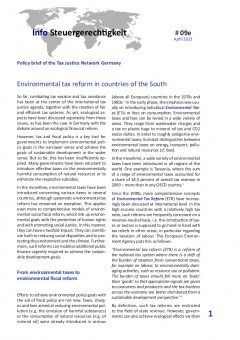
"So far, combating tax evasion and tax avoidance has been at the centre of the international tax justice agenda, together with the creation of fair and efficient tax systems. As yet, ecological aspects have been discussed separately from these issues, as has been the case in Germany with the debate around an ecological financial reform.
However, tax and fiscal policy is a key tool for governments to implement environmental policy goals in the narrower sense and achieve the goals of sustainable development in the wider sense. But so far, this has been insufficiently applied. Many governments have been reluctant to introduce effective taxes on the environmentally harmful consumption of natural resources or to eliminate the respective subsidies.
In the meantime, environmental taxes have been introduced concerning various items in several countries, although systematic environmental tax reform has remained an exception. This applies even more to comprehensive models of environ- mental-social fiscal reform, which link up environmental goals with the protection of human rights and with promoting social justice. In this manner, they can have a twofold impact: They can contrib- ute both to reducing social disparities and to protecting the environment and the climate. Furthermore, such reforms can mobilise additional public finance urgently required to achieve the sustainable development goals."
"Info Steuergerechtigkeit #09" takes a closer look at the concepts of environmental tax reform vs. eco-social fiscal reforms, draws from experiences with environmental taxes and draws conclusions for the introduction of a comprehensive Eco-Social Fiscal Reform.
By Jens Martens and Wolfgang Obenland
Published by GPF Europe and Tax Justice Network Germany
Bonn/ Berlin, April 2013
